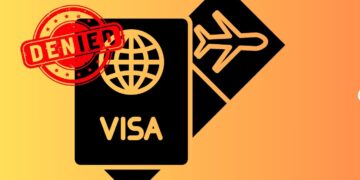If you’re Nigerian or from a non-EU country and want to visit Europe, you may have heard of the “Schengen Visa.” This term is crucial. It can impact your trip, depending on which European country you visit.
In this article, we will provide all you need to know about the Schengen visa and how it can benefit you.
Here is everything you must know about the Schengen Visa
What is a Schengen Visa?
The Schengen Visa is a type of visa that makes it possible for international individuals outside of Europe to travel freely within the Schengen Area. This area comprises 25 countries in Europe, and 4 non-European countries that have agreed on a no-border control between them.
This means that with the visa, you get to travel to all 29 countries without requiring to have a separate visa for each country. Keep in mind, however, that you can only stay in the country using the visa for 90 days within 180 days.
Of the 44 countries in Europe and the 27 EU member states, 25 fall under the Schengen area, with some non-EU nations: Norway, Iceland, Switzerland, and Liechtenstein. Here are the countries that fall in this area:
- Austria
- Belgium
- Croatia
- Czech Republic
- Denmark
- Estonia
- Finland
- France
- Germany
- Greece
- Hungary
- Iceland
- Italy
- Latvia
- Liechtenstein
- Lithuania
- Luxembourg
- Malta
- Netherlands
- Norway
- Poland
- Portugal
- Slovakia
- Slovenia
- Spain
- Sweden
- Switzerland
- Bulgaria*
- Romania*
*Note: Bulgaria and Romania joined the Schengen Zone for air and sea travel in 2024.
Types of Schengen Visas
Visas to Schengen countries serve for tourists, business individuals, visiting family and friends, medical visits, short-term studies and trainings, and conferences, among other things. The visas are of the following types:
1. Type C (Uniform Schengen Visa)
This visa is available for short stays. It is common for tourism, business, and family visits. With this visa, you are allowed to stay up to 90 days within 180 days
2. Type A (Airport Transit Visa)
This visa type is needed when you are transiting through airports in the Schengen Area or having to change flights.
3. Type D (National Visa)
This visa gives a longer stay of more than 90 days in the Schengen Area. It is for study, work, long-term residency, or family reunion.
SEE ALSO: Visa-Free Countries for Nigerian Passport Holders
Applying for a Schengen Visa
The application process for a Schengen Visa is pretty much straightforward. Once you decide the country of your mainstay or entry, here are the steps to take:
- Apply through the embassy or consulate of the country.
- Book an Appointment either through the website or an outsourcing agent
- Have all your documents together, including a valid passport, a completed visa application form, and recent passport photographs.
- Also, have proof of funds, proof of accommodation, travel insurance, and travel itinerary.
- With all your documents together, the next thing is to have your biometrics done at the embassy or application center.
- Finally, the waiting process can take between 7 to 15 days, although it can sometimes take longer, most especially during peak seasons. During these times, it can take as much as 30–60 days for your visa to be processed.
Why your Schengen Visa application can be denied
While the application for a visa to the Schengen areas may seem straightforward, there are several reasons why your application may be delayed or denied entirely. Here are some of the top reasons:
- Previous immigration issues: If you have ever overstayed your visa or broken immigration rules in another country, it can affect your ability to secure this visa.
- Insufficient financial proof: The idea behind showing proof of funds is to indicate that you will be able to take care of yourself in your destination country. If you cannot prove this, your visa will most likely be denied.
- Unclear travel Purpose
- Lack of travel insurance
- Fake documents








